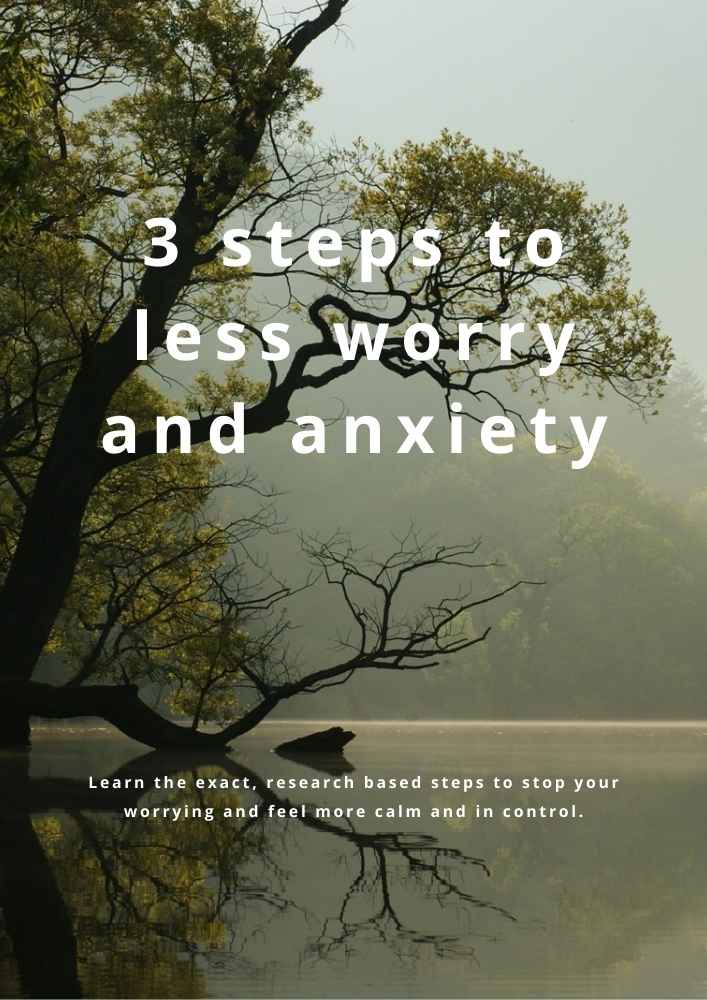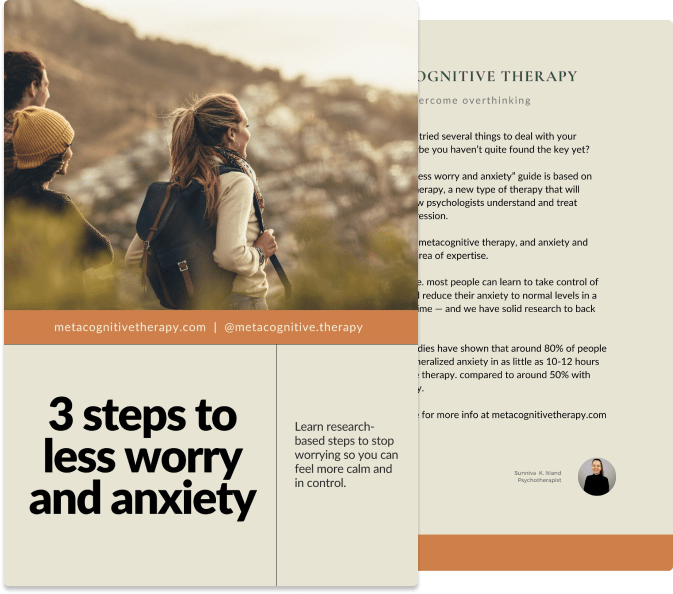How to navigate love and dating with relationship OCD

Download our best tips on reducing anxiety and worrying
Learn three powerful metacognitive therapy steps to stop the worry cycle, reduce anxiety, and feel calmer in everyday life.
.jpeg)
.jpeg)
Relationship OCD (ROCD) is a lesser-known form of obsessive-compulsive disorder where people can become consumed with doubts about their relationships.
These doubts are usually centred around a current partner, but they can also extend to friends, family, or even pets.
But when it comes to OCD, overthinking in relationships isn’t about love, or your partner. It’s about how you relate to doubt and what you believe about negative thoughts.
What Is Relationship OCD?
The hallmark of Relationship OCD isn’t just doubt… it’s the obsessive effort to achieve complete clarity and emotional certainty about the relationship. People with ROCD don’t just wonder if they’re in the “right” relationship, they ruminate, evaluate, and compare endlessly, spending hours a day overthinking.
OCD is often associated with outward behaviours, like excessive handwashing, but it can also manifest without any visible signs. ROCD is typically involves internal compulsions: repetitive thoughts, emotional checking, and relentless mental analysis.
What’s at the root of it?
At the core of ROCD is a need to feel 100% certain that your partner is the right one, that your feelings are strong enough, that there’s no one better out there. This desire for certainty can follow people from one relationship to the next, creating a pattern of doubt and breakups, no matter how compatible or loving the relationship actually is.
And the more people think about these doubts, the less clarity they tend to have, because rumination only intensifies uncertainty.
Metacognitive Therapy (MCT), a new form of psychotherapy focused on how people relate to their thoughts, zooms in on this as the real issue: It’s not the doubt itself, it’s the mental habits that sustain it.

Download our best tips on reducing anxiety and worrying
Learn three powerful metacognitive therapy steps to stop the worry cycle, reduce anxiety, and feel calmer in everyday life.
Why overthinking backfires
People with ROCD often try to suppress or “solve” their doubts. They might analyze how they feel toward their partner, compare their relationship to others, or constantly check their level of attraction. They might also engage in overt compulsions, like asking their partner if they love them, testing them with questions, or seeking reassurance from others.
These strategies are meant to reduce anxiety, but they backfire. That constant checking and rumination interferes with your ability to connect with your own intuition. As doubt becomes all-consuming, you can lose touch with your gut feelings and emotions. That can cause you to stay in bad relationships out of confusion, or end good relationships prematurely because you mistaken doubt for a warning sign.
How to move from thought control to thought acceptance
In MCT, the goal isn’t to eliminate doubt — it’s to change how we respond to it. Most people have passing thoughts, like What if I’m not really in love? or Is this person really right for me? These thoughts are normal, but not everyone treats them as meaningful or urgent.
Instead of trying to control or suppress thoughts, MCT helps people treat thoughts and feelings as transient experiences that come and go when we let them regulate naturally, not as important signals or messages. We all have the ability to let thoughts and doubts pass without responding to them. Detached mindfulness exercises shows you how you can relate to thoughts in this passive way — even the scary or triggering ones.
Another MCT approach is postponement, delaying rumination or reassurance-seeking until a later time. This helps break the automatic cycle of compulsion and shows you that the discomfort will fade on its own, if you let it.
More thinking ≠ more certainty
One of the most important shifts in MCT is questioning the belief that worry is uncontrollable, or that more thinking and worrying leads to more clarity and certainty. But has overthinking ever led to better decisions? The reality is, excessive mental analysis usually makes people feel less certain. MCT helps you recognize that constantly scanning your emotions, testing your partner, or analyzing your relationship are the very behaviours keeping you stuck.
By reducing the time you spend on rumination, you’ll often find that genuine feelings (positive or negative) become clearer. When you don't get caught up in every fear, it's easier to tap into your intuition and have clarity in your decision-making, whether that means staying in a relationship or leaving it. Most importantly, you can enjoy your relationships more when you aren’t consumed by doubt.
Redefining doubt
In ROCD, the problem isn’t the questions that crop up, or the presence of doubt — it’s the significance we place on those doubt thoughts. MCT helps people decouple doubt from action. Just because you notice a feeling of uncertainty, doesn’t necessarily mean something is wrong or that you need to solve it. Just because you don’t feel “in love” every second of your relationship, doesn’t mean the relationship is doomed.
Through Metacognitive Therapy, people can shift from controlling their thoughts to letting them pass, from solving doubt to existing with it. It’s not always about changing your relationship with your partner… it’s about changing your relationship to your mind, so you can find freedom from the cycle of overthinking and feel more present with the people you love.
If you're struggling with symptoms of OCD, find out more about how to deal with compulsive thoughts here.



